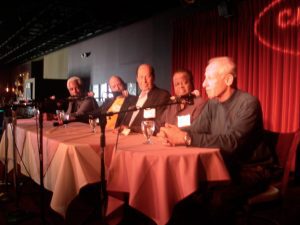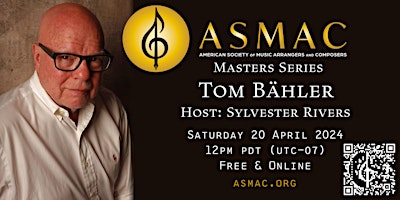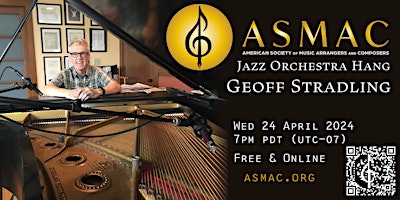The Sound of Motown
By Jeannie Pool
The American Society of Music arrangers & Composers presented a panel discussion, “The Sound of Motown, from Detroit to Los Angeles” at its monthly luncheon, November 14 at Catalina’s in Hollywood. Keyboardist, composer, and producer Clarence McDonald moderated the panel that included Marvin Augustus, David Blumberg, Sylvester Rivers, and Don Peake.  This session was a follow-up to last summer’s ASMAC arranging workshop with Paul Riser (see July 2007 “Overture”). Because the Motown sound has had a dramatic impact on American popular music, it is fascinating to hear the stories of the individual musicians who were an integral part of that famed organization.
This session was a follow-up to last summer’s ASMAC arranging workshop with Paul Riser (see July 2007 “Overture”). Because the Motown sound has had a dramatic impact on American popular music, it is fascinating to hear the stories of the individual musicians who were an integral part of that famed organization.
Keyboardist Clarence McDonald has worked with everyone from the Jackson 5 to Diana Ross, Patti LaBelle, Bill Withers, Billy Preston, James Taylor, Ray Charles, Deniece Williams, and Gladys Knight including keyboards for the recent TV mini-series about the Temptations.
Marvin Augustus’s arranging and orchestrating credits include “Lady Sings the Blues,” “Which Way Is Up?”, “Outrageous Fortune,” the TV miniseries “The Temptations,” “The Temptation Reunion Tour “(1982), “Motown 25: Yesterday, Today and Forever,” the N.A.A.C.P Image Awards, arranged, orchestrated, composed and produced for recording artists such as Phil Collins, Gladys Knight, Anita Baker, Lionel Richie, Mavis Staples, and the Doobie Brothers, to name a few.
Composer/arranger David Blumberg worked for Motown over 11 years, on countless albums including three albums with the Jackson 5, worked with Marvin Gaye, Stevie Wonder, Diana Ross, Barbra Streisand, Patti LaBelle, and is well known for arranging Gloria Gaynor’s “I Will Survive;” orchestrator/arranger for Herbie Hancock on four films including the 1987 Oscar winner for music, “Round Midnight;” currently working on “American Idol,” documentary films and new chamber compositions.
Composer, arranger and pianist Sylvester Rivers has recorded with Diana Ross, Smokey Robinson, The Temptations & many more; played for Holland-Dozier-Holland’s labels on such hits as the Honey Cone’s, “Want Ads,” and Freda Payne’s, “Bring the Boys Home;” scored number one R&B hits with Candi Staton’s, “Young Hearts Run Free” and “Victim;” in the recording studio, with Kenny Rogers. Lionel Richie and Diana Ross, plus the multi-platinum New Edition album, “New Edition,”
Guitarist and arranger Don Peake, who played many Motown West Coast sessions as a staff guitarist, recorded with the Commodores, Marvin Gaye, Jackson 5, The Temptations, and Smokey Robinson. He started his career touring with the Ray Charles Orchestra.
Dave Blumberg started his career at Venture Records and worked with producers Clarence Paul and Mickey Stevens, and with Hal Davis, “a very imposing presence,” for 11 years. Blumberg worked with the Jackson 5, including the arrangement for them of “Zippity-doo-dah.” He describes working with Hal as “training under fire,” and can boast about two hit records as the results.
Sylvester Rivers, originally from Detroit, and a generation younger than the legendary Funk Brothers, describes Motown as a factory system for producing recordings. Rivers was a staff pianist for a label, Invictus Records and at Motown; he worked with Holland-Dozier-Holland. His first hit was with The Temptations. He reminded the audience that the famous Motown Studio A was in fact a converted basement of a house. He mentioned working with James Jamieson, bass player (who can be heard on Sylvester’s piano track), and he said, “Those records sound like a party because it was a party.” Rivers moved to Los Angeles in 1974 and the Los Angeles Motown was a very conventional record company, very different from the Detroit operation.
Clarence McDonald remembered that Motown in Detroit used different studios for recording. The one that was Motown’s most famous originally was built and operated by Poppy Sound.
All the panelists agreed that getting royalties for Motown recordings “was a bear.” There were always (too) short lead times for projects and it was best not to be subtle in the arrangements, but to throw everything into the arrangement. McDonald said that Motown spent the time and money to groom the artists. “Barry would give you a chance and allowed you to make a mistake, and then would give you a second chance.” This paid off for Motown big time.
Rivers added the Motown worked like the Hollywood studio system during the Golden Age. Many groups bombed, like the Supremes, before they made hits. “The system was stronger than the individual parts. Barry believed in a song and produced it until it worked. Now we have a throw-away kind of society, where you may only get one chance.” McDonald added that it was just like Detroit’s General Motors, but it was music.
Augustus pointed out that many of the projects did not have song titles when the arrangers were working on them and when they were recorded. This confusion has had a negative impact on royalties for the talent. Don Peake said the name changes also impacted the session players’ payments as well.
Someone in the audience asked for the panelists’ opinion on “Dreamgirls” (2006 film DreamWorks and Paramount Pictures, a film adaptation of the 1981 Broadway musical). McDonald said that it was “too polite. Rivers commented that Berry Gordy was portrayed as a bad guy and that was totally false. Blumberg said he thought unfortunately there were “no Motown-quality songs in “Dreamgirls,” and McDonald quoted Paul Riser who always says, “We wouldn’t be here if it weren’t for Berry. Afterall, nobody likes the boss.”
As an example of how the Motown system worked, Blumberg talked about “Love Hangover” and said that the original track may have been a 9-minute track, sung by Diana Ross. It became a hit however only after it was recorded by the Fifth Dimension; and both versions were released at the same time, going toe-to-toe on the charts allowing Diana Ross reinvented herself as a disco diva.
There was a question from the audience about record distribution and McDonald said that the record promotion person had a brown paper bag “to fund people” and everyone in the business was involved in that. The panelists recommend Gordy’s autobiography, “To Be Loved: The Music, the Magic, the Memories of Motown” (1995).
In response to other questions from the audience, Rivers said that it was not until the mid to late 1970s that Motown insisted on separate sectional recording sessions for strings or horns. Asked who decided who would do what arrangement, McDonald said it was decided by “the committee,” but there was much secrecy about arrangers and no credits for them on the projects. Rivers said his first credit at Motown “happened after I left town,” when he came to Los Angeles. Blumberg pointed out that rhythm sessions were the most important and that the arrangers were called by the producers. McDonald said that much talent was “pigeonholed” and that people were called upon to come up with the same kind of thing again and again and creativity was not always encouraged. Blumberg mentioned that the arranger Gene Page (1938-1998) was doing 25 or 30 arrangements per week in those days. Rivers said that usually they had 14 strings for a string session and that Paul Riser’s favorite combination was for sixteen strings. Gene Page used 8 plus 2 plus 2 and a harp. Blumberg said that the joke was “eight strings with mirrors,” meaning that the tracks were routinely doubled.
The audience thoroughly enjoyed hearing these additional Motown stories, especially from the point of view of the arrangers and session musicians.



